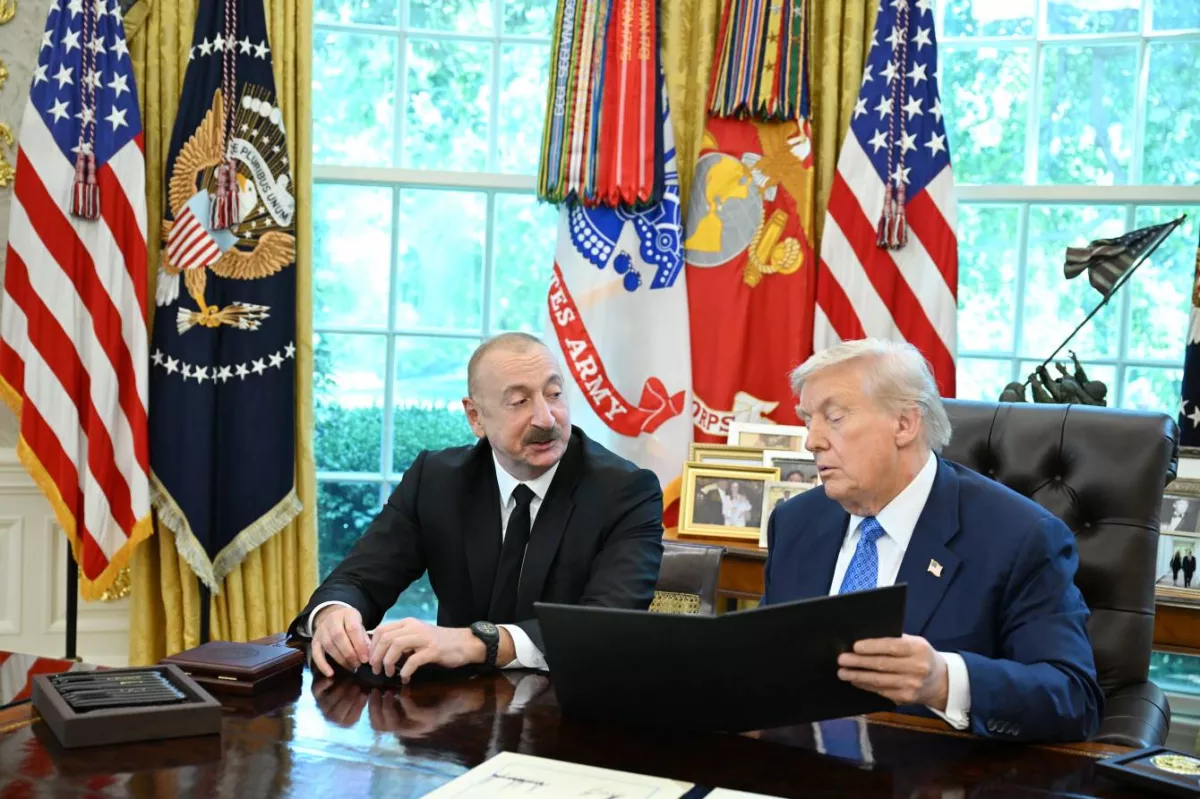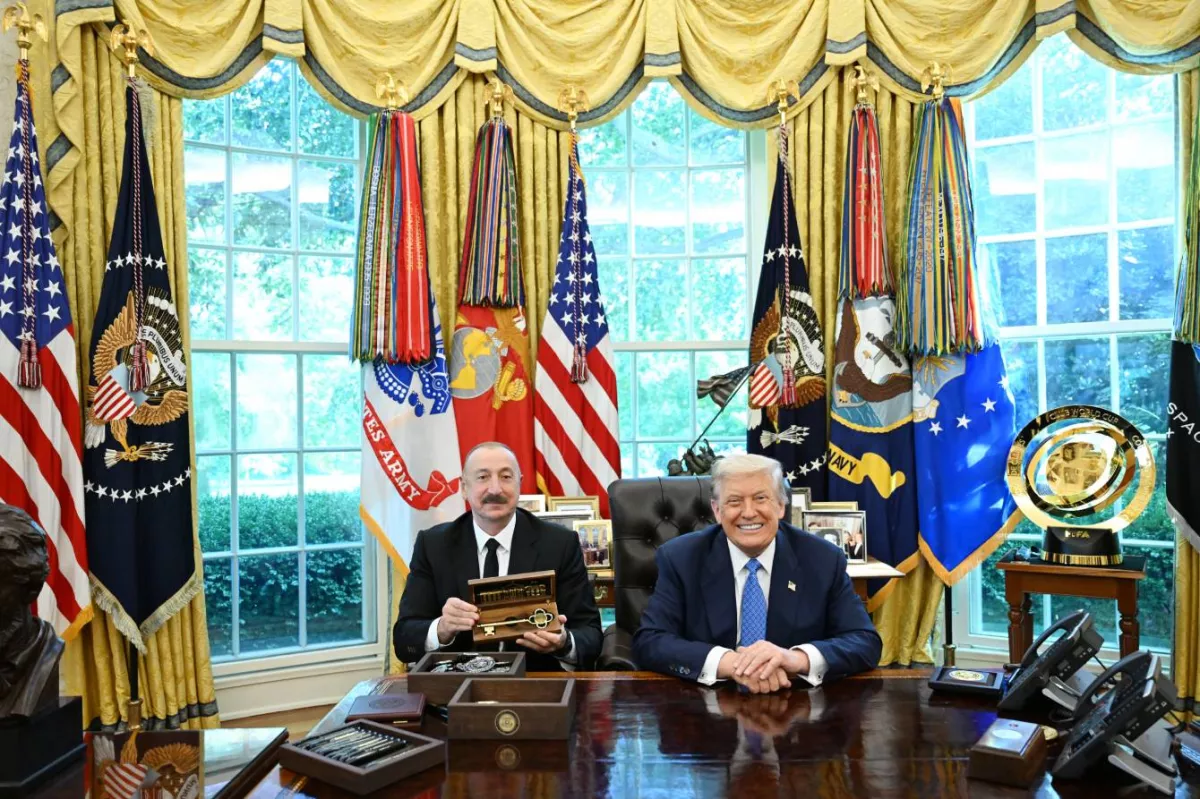Leaders who change history Aliyev and Trump on peace and partnership
In the realm of global geopolitics, interpersonal relationships between state leaders have always played — and continue to play — a crucial role. Naturally, these relationships can either propel history forward or, conversely, hold it back, or even push it backward.
In this regard, the relationship between the Presidents of Azerbaijan and the United States — Ilham Aliyev and Donald Trump — serves as an example of the first scenario, where mutual understanding ensures steady progress. What is especially important is that this progress has the potential to influence not only bilateral relations but also, one might say, the global arena (at least in several regions of the world).

We saw confirmation of this in the transcript released yesterday of the conversation between the Azerbaijani and American leaders, which took place shortly after the signing of the Memorandum of Understanding between Baku and Washington on the establishment of a Strategic Working Group aimed at preparing a Charter of Strategic Partnership between the two countries.
The atmosphere of the conversation clearly reflected warmth throughout the dialogue. This was not a staged or artificial exchange, where, as we often witness, heads of state limit themselves to routine, meaningless phrases. In this case, from the very beginning, the interaction was marked not only by mutual interest but also by specificity — which was expressed not in vague or evasive terms but in sincerity and a deep understanding of the subject matter, if one may say so.
The discussion at hand concerned geopolitical issues, within which prospects were visible not only for the South Caucasus but also for a much wider area.
The confirmation of what has been said can be seen from the very first moments of the conversation, when in response to President Ilham Aliyev’s statement that the end of the 33-year-long anti-Azerbaijani sanctions by the United States became a reality thanks to the current White House occupant, Trump sincerely called the Azerbaijani people “great.” At the same time, the American leader did not hesitate to admit that he had been closely following Ilham Aliyev’s statements “in the American direction,” as he put it, “even before we won the elections.”
Some might think that this phrase merely demonstrates Trump’s interest in public remarks concerning himself. However, the Azerbaijani president’s admission in an interview with Azerbaijani media that he was extremely surprised by the U.S. president’s knowledge about Azerbaijan clearly indicates Trump’s deep understanding of the geopolitical importance of the country.
There is no reason to doubt that Trump is well aware that the President of Azerbaijan always speaks the truth, and therefore, behind Ilham Aliyev’s sincere confirmation of the Oval Office occupant’s knowledge about Azerbaijan lies reality.
In this context, it is certainly significant that the leader of Azerbaijan highlighted the high value placed on personal relations. He also revealed the detail that the signing of the document to repeal the anti-Azerbaijani Section 907 of the “Freedom Support Act” took place “with my presence in the office,” which carries special symbolic meaning.
As Ilham Aliyev emphasised in the same interview with Azerbaijani media, Trump could have taken this action in another way — for example, by signing the document later — but chose to do so “in the presence of the President of Azerbaijan, a country that was unjustly subjected to sanctions by Congress in 1992.”
An important nuance, isn’t it? It demonstrates the unique atmosphere in the relationship between the two presidents. It is no coincidence that when the Azerbaijani leader mentioned during the conversation Trump’s contribution to peace-building in Asia, Africa, and the South Caucasus over recent months, the American leader, agreeing that “we have done some great things,” added: “You would do the same.” He then complemented: “You negotiate very well.”

Then, after discussing a number of other issues, both presidents acknowledged each other as “great leaders,” after which Trump presented Ilham Aliyev with a gift — coins which, according to him, are among the most valuable in the world, along with symbolic keys to the White House. The significance of the latter moment lies in the fact that, as Trump stated, he hands over the keys only on rare occasions.
We must agree that these aforementioned aspects perfectly illustrate how, even in today’s world (and arguably not only today’s), the personal background of relationships between political leaders can become the foundation for resolving the most important geopolitical challenges.
The mutual understanding between the Presidents of Azerbaijan and the United States demonstrates to the entire world the direction in which American-Azerbaijani relations can be expected to develop.
Thus, the realities shaped by the well-calibrated policy of President Ilham Aliyev in the South Caucasus are accepted by all global powers. And in this lies an example of the brilliant policy of official Baku.








